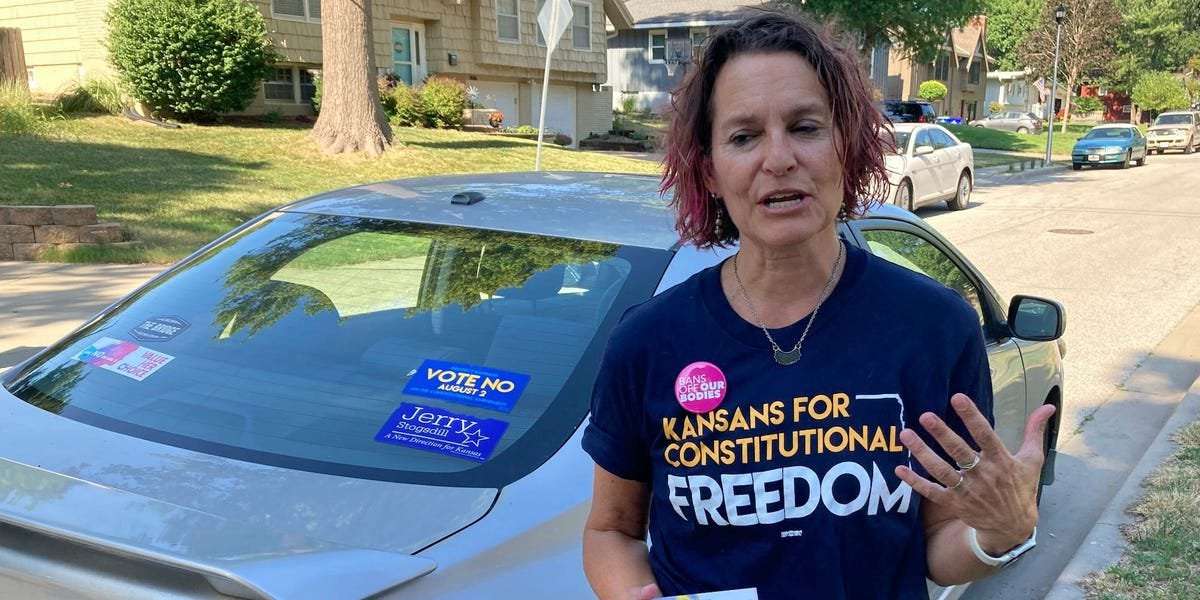Kansas voters turned out in huge numbers to defeat an anti-abortion amendment.
The state was poised early Wednesday to reject the amendment by a margin of over 20 points.
The high turnout is a major loss for anti-abortion groups and a warning sign for the GOP.
Sign up for our newsletter to receive our top stories based on your reading preferences — delivered daily to your inbox. Loading Something is loading. Email address By clicking ‘Sign up’, you agree to receive marketing emails from Insider as well as other partner offers and accept our Terms of Service and Privacy Policy
Kansas voters turned out in droves to reject the first anti-abortion ballot measure in the post-Roe v. Wade era — and dealt a major warning sign to Republicans hoping the drastic curtailing of abortion rights nationwide won't dent their prospects in the 2022 midterm elections.
Amendment 2 was pushed by anti-abortion activists and would have eliminated the right to abortion and government funding for abortion under the Kansas Constitution. With over 900,000 votes counted as of 11:30 a.m. ET Wednesday, "no" was trouncing "yes" by 59 to 41%, a gaping 18-point margin.
The blowout defeat of the measure spells trouble for future anti-abortion ballot measures, two of which are up for a vote in November in Kentucky and Montana, and, more significantly, Republicans' hopes for muted Democratic enthusiasm and turnout for the midterms in November, which could doom many state-level elected officials who champion harsh abortion bans and restrictions.
The number of votes cast on the measure nearly matches the roughly one million votes cast in the general election in 2018, when a Democratic "blue wave" washed over the midterm elections, according to the US Elections Project. That number also surpasses the roughly 887,00 votes cast in the general election in 2014 and the 858,000 cast in 2010 — both midterm years when the political climate largely favored Republicans.
With over 900,000 voters turning out to vote on the measure — compared with 470,000 who voted in the 2018 Kansas gubernatorial primaries — the referendum demonstrated a potent motivator for abortion-rights supporters. With the 2022 election ahead, abortion access being directly on the ballot could pose a serious problem for the GOP that it hadn't had to face in a world without Roe v. Wade's protections.
A "yes" vote on the measure would have eliminated the right to abortion under the state constitution, while the "no" vote left the constitutional protections to abortion in Kansas unchanged, preserving the status quo.
Lower turnout levels typically associated with primaries, especially in midterm elections, and a political environment favoring the Republican Party were initially anticipated to favor proponents of the amendment.
But before polls even closed, Kansas' chief election official, Secretary of State Scott Schwab, predicted that turnout in the primary was on track to surpass the 36% of the electorate the office had projected and could go as high as 50%, a notably high rate for a midterm-year primary.
With over 99% of the votes reported, the "no" vote on the measure significantly outperformed President Joe Biden's vote share in several blue counties he won in the 2020 election.
Meanwhile, the "yes" vote underperformed and failed to crack 60% of the vote in several counties President Donald Trump won handily in 2020.
A sign supporting the measure in a yard in Olathe, Kansas, on July 8. John Hanna/AP
Americans' views on abortion can, in many cases, be murky and hard to parse, but polls indicated most opposed overturning Roe v. Wade, and the result of the Kansas referendum suggests strict abortion bans or "trigger laws" are often overwhelmingly unpopular among voters of both major political parties.
And when given the chance to shape abortion policy directly, Kansas voters displayed no appetite for enabling strict abortion bans after nearly six weeks of being faced with the real-world consequences playing out across the country.
The voters' decision upholds a 2019 ruling by the Kansas Supreme Court establishing a right to abortion under the Kansas Bill of Rights, preserving a legal guardrail against the kind of abortion restrictions that may be passed into law if a Republican wins the governor's race in November.
It also — for now — maintains Kansas' status as a crucial access point for abortion care in the Midwest and Southwest.

EphraimJenkins on August 3rd, 2022 at 14:41 UTC »
If everyone votes, republicans lose. So let’s go, everyone !
shapu on August 3rd, 2022 at 13:38 UTC »
The lesson here is that Democrats NEED to campaign on abortion rights. "All those things we told you about how horrible Republicans were? We were right. You can bend to them or you can support women and girls and defend their right to choose.'
jeffinRTP on August 3rd, 2022 at 13:00 UTC »
Now we need the same thing in the general election otherwise they will try again or in some other way.